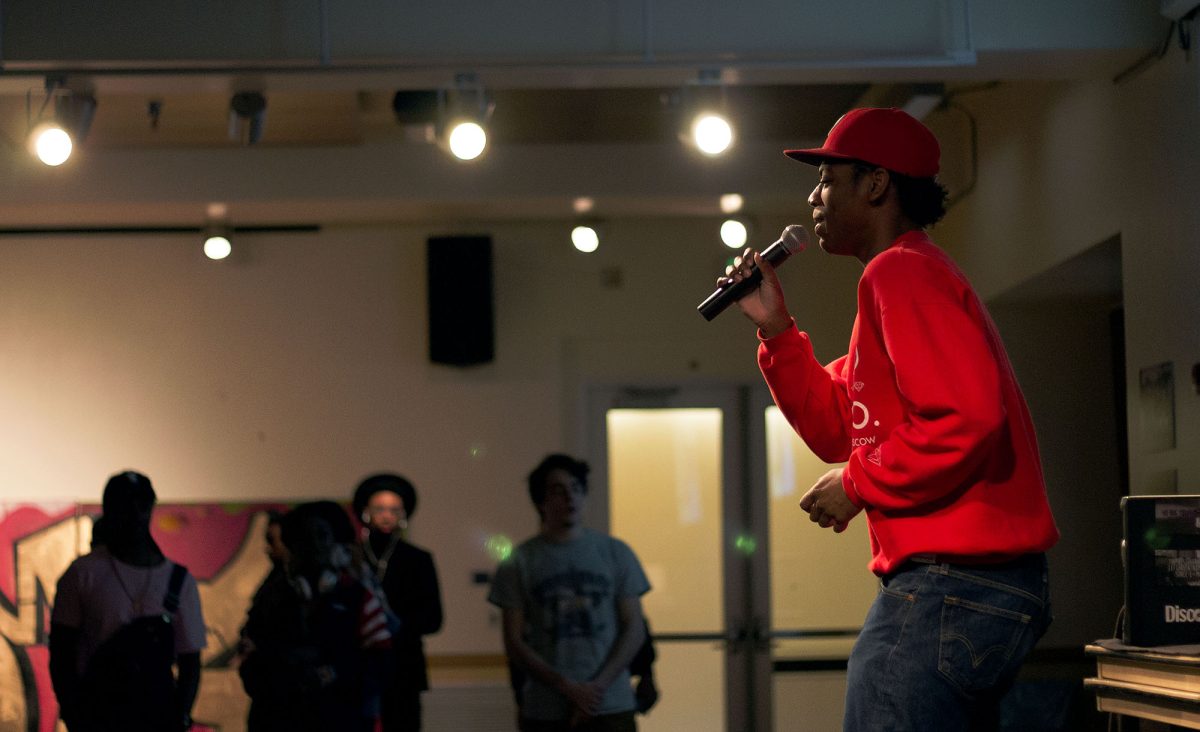Story by Meaghan Morawski
Photos by Sean Danaher
“Toast, toast, toast. Toast and pepper jelly? Josh, can you hear me? We can all see you beautiful people, but we want to hear you too,” says Jorah LaFleur, as she giddily checks the mic.
It’s a typical night at the Eugene Poetry Slam, hosted every second Saturday of the month at local bookstore Tsunami Books. After a few minutes of mic checks by LaFleur (the night’s host) followed by several open mic presentations, the main event begins.
Four poets into the competition, a lanky teenager dressed head to toe in black, save for a red tie, strides up to the mic. His hands are shaking exiguously, despite a confident tone in his voice. When he begins speaking there’s a slight lisp, but looking out on the crowd from his unmistakable place of power on stage, he doesn’t care. Neither does the audience. They’re hanging on to his three-minute performance as if it’s their only sustenance. The mic is solely his.
This is Damien Maxwell. A cool, confident, nonplussed 15-year-old who can spin words like Arachne spun silk. Life is sharp and discordant, but Maxwell can make even the most cacophonic sounds flow like birdsong.
Davan Michael Myrand Overton is none of those things. Davan is a slightly unsure freshman at Mapleton High School, a small school of only 86 students. Davan skips words when he’s writing due to Dandy-Walker syndrome, a cyst in the brain that affects his writing and gross motor skills.
Damien and Davan couldn’t be more different. That is, if they weren’t the same person.
Damien is the pen name and alter ego Davan created for his work in slam poetry. “I was in a deep, deep depression so I was writing really dark, sad stuff. Once I found this poetry slam, it was like a second life for me. The first life, which has all of the baggage and everything, goes away when I’m in the second and it’s just an amazing feeling.”
Davan explains all this while sitting nervously on the couch in his family’s Walton, Oregon, home. His mother, Melissa, sits to his left, facing him for reassurance. She is a matronly woman with short, fiery red hair that matches her vivacious, sharp personality. Davan’s mother is an important guide for him in the world of slam as she herself lives, writes, and performs with a disorder; Melissa is bipolar.
The Overtons first found the welcoming world of slam poetry a little over a year ago when Melissa took Davan to participate in workshops held by The Young Writers Association. The last day of class dealt with poetry and featured Eugene Poetry Slam MC and spoken word artist Jorah LaFleur as a guest speaker. After talking to LaFleur and making sure a slam could be a safe and accepting platform for expression, Melissa began bringing Davan to the event at Tsunami Books.
“Because of the material a lot of people read, you don’t see that much family involvement,” LaFleur says, referring to slam topics like sex and death. “I appreciate that for [Melissa and her kids] slam is a really healthy decision. They all feel good about it, and it’s obviously something powerful and meaningful for each of them individually.”
Since her bipolar disorder tends to “run on the high side,” Melissa says she is considered legally disabled. For this reason, she can’t drive, so her father takes the family to the Eugene slam, a roundtrip of 80 minutes.
“It’s very much a family affair,” Melissa says of the monthly pilgrimage. It’s also an essential tool for communication between Davan and Melissa. There are things, Davan says, that he and his two sisters have learned about their mother through slam that they may never otherwise have known. The same is true for Melissa.
“I learn a lot about you through your poetry,” she says to her son, placing a reassuring hand on his shoulder. “[It helps with] learning about you and helping you through what you need to go through at that time. We’re really lucky we have that.”
Many of the topics slam has opened up for the family delve into the complex. For example, the poem Damien read at a performance in October dealt with paranoia brought on by an ex-girlfriend before she moved to South Dakota.
“Her boyfriend there actually threatened to kill me and it was freaky,” Davan says. “Paranoia really set in and I kept looking over my shoulder every five seconds. I just couldn’t handle it. [It helped when] got a lot of thoughts out on paper.”
According to Melissa: “Davan’s paranoia got very severe at points, but the writing is definitely an outlet for him to work through what is going on in his head.”
A focal point in Melissa’s poetry is her mother, whom Melissa cared for until her mom’s death from diabetes in 2001. Melissa says everything that could have gone wrong with her mother’s sickness did.
“You know when you let the string out on a yo-yo and start swinging it? The sicker [my mom] got, the faster it went, and when she died it was like someone let go of that string and I went hurtling through space. That was my first truly manic episode, and it was a difficult time for me,” she says, looking at a photo taken of her and her mother on Melissa’s first Mother’s Day.
Through slam the Overtons met Nigel Burch, a 29-year-old poet, preschool teacher, and musician, who has become a mentor to Davan. According to Burch, writing poetry and attending the Eugene slam is a therapeutic practice for both Davan and his mother.
“He and his mom are a good combination,” Burch says. “They’re very similar, and I’m happy that they’re able to express themselves like that because they do a pretty great job. I think it’s just so powerful, and it helps them in their lives.”
Though a fundamental premise of a poetry slam is the scoring of poems on a 10-point scale, most participants agree that, above all else, a slam is about expression.
“The point is not the point. The point is the poetry,” LaFleur says. “It’s just yourself and your voice and your words. I really like the levelness of that and I like that people can come to this art form from all different places and you’re not inhibited by insecurities.”
Both Burch and LaFleur believe that with the continuing support of his family and the growing confidence that comes from speaking at the monthly slam, Davan has the ability to go far.
“I think this is just the beginning,” says Burch with an enthusiastic grin on his face. “I think Davan’s going to make some serious, positive changes [in the world]. He’s very young, but he’s going to be a writer of some sort if he wants to be, and a performer also if he can harness that potential.”
Davan has a similar dream. Back in Walton, Melissa and Davan get up from the couch to greet a neighbor on the front porch. Outside, Davan divulges his dream of touring as a spoken word artist.
“It would be really cool to just stop school and do that,” he says with a meditative look in his eyes. “But we’ll see.”
Categories:
Talk Therapy
January 9, 2012

Talk Therapy
0
More to Discover














